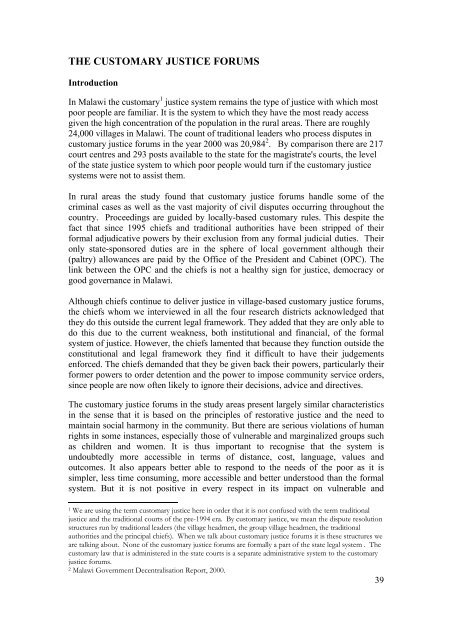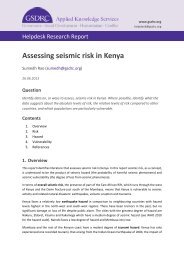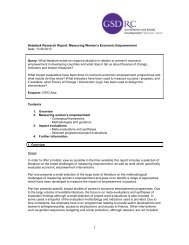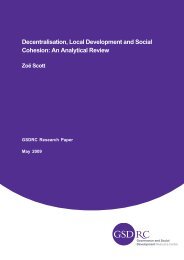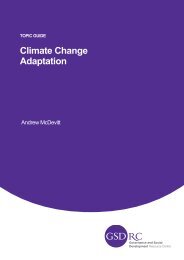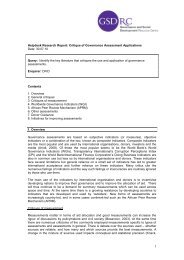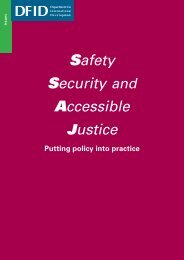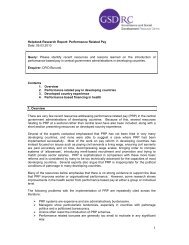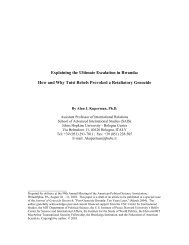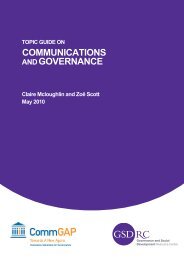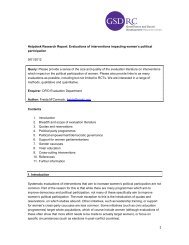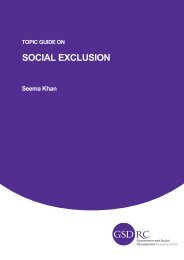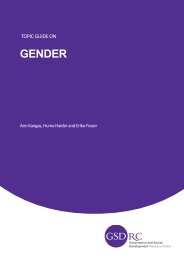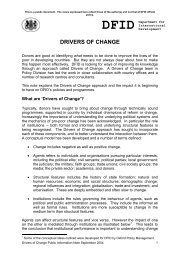ACCESS TO JUSTICE FOR THE POOR OF MALAWI? AN ... - GSDRC
ACCESS TO JUSTICE FOR THE POOR OF MALAWI? AN ... - GSDRC
ACCESS TO JUSTICE FOR THE POOR OF MALAWI? AN ... - GSDRC
- No tags were found...
Create successful ePaper yourself
Turn your PDF publications into a flip-book with our unique Google optimized e-Paper software.
<strong>THE</strong> CUS<strong>TO</strong>MARY <strong>JUSTICE</strong> <strong>FOR</strong>UMSIntroductionIn Malawi the customary 1 justice system remains the type of justice with which mostpoor people are familiar. It is the system to which they have the most ready accessgiven the high concentration of the population in the rural areas. There are roughly24,000 villages in Malawi. The count of traditional leaders who process disputes incustomary justice forums in the year 2000 was 20,984 2 . By comparison there are 217court centres and 293 posts available to the state for the magistrate's courts, the levelof the state justice system to which poor people would turn if the customary justicesystems were not to assist them.In rural areas the study found that customary justice forums handle some of thecriminal cases as well as the vast majority of civil disputes occurring throughout thecountry. Proceedings are guided by locally-based customary rules. This despite thefact that since 1995 chiefs and traditional authorities have been stripped of theirformal adjudicative powers by their exclusion from any formal judicial duties. Theironly state-sponsored duties are in the sphere of local government although their(paltry) allowances are paid by the Office of the President and Cabinet (OPC). Thelink between the OPC and the chiefs is not a healthy sign for justice, democracy orgood governance in Malawi.Although chiefs continue to deliver justice in village-based customary justice forums,the chiefs whom we interviewed in all the four research districts acknowledged thatthey do this outside the current legal framework. They added that they are only able todo this due to the current weakness, both institutional and financial, of the formalsystem of justice. However, the chiefs lamented that because they function outside theconstitutional and legal framework they find it difficult to have their judgementsenforced. The chiefs demanded that they be given back their powers, particularly theirformer powers to order detention and the power to impose community service orders,since people are now often likely to ignore their decisions, advice and directives.The customary justice forums in the study areas present largely similar characteristicsin the sense that it is based on the principles of restorative justice and the need tomaintain social harmony in the community. But there are serious violations of humanrights in some instances, especially those of vulnerable and marginalized groups suchas children and women. It is thus important to recognise that the system isundoubtedly more accessible in terms of distance, cost, language, values andoutcomes. It also appears better able to respond to the needs of the poor as it issimpler, less time consuming, more accessible and better understood than the formalsystem. But it is not positive in every respect in its impact on vulnerable and1 We are using the term customary justice here in order that it is not confused with the term traditionaljustice and the traditional courts of the pre-1994 era. By customary justice, we mean the dispute resolutionstructures run by traditional leaders (the village headmen, the group village headmen, the traditionalauthorities and the principal chiefs). When we talk about customary justice forums it is these structures weare talking about. None of the customary justice forums are formally a part of the state legal system . Thecustomary law that is administered in the state courts is a separate administrative system to the customaryjustice forums.2 Malawi Government Decentralisation Report, 2000.39


